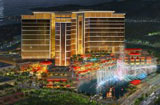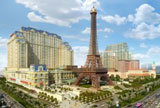Someone once said that it is every woman’s inalienable right to change her mind about what to wear. We think we ought to borrow from such timeless wisdom and change our minds about the Macau gaming sector now that we have seen the latest results from SJM.
It’s not a eureka moment. This has been building steadily over the past year, nagging at us like a spouse in a seven-year marriage. Until now, we had been firm believers in the mantra that Ebitda is Everything. As long as a company has positive cashflow with which to reinvest in a booming market like Macau, it should, to quote Barack Obama, own the future. But now we are starting to better understand the wisdom of common Chinese corporate philosophy that cash, rather than cashflow, is king over the longer term. And it’s not so much what you do as who you do it with that counts in the world of Chinese business, which is what the Macau gaming sector is an extension of.
Indeed, over the past year, SJM has shown itself, in our newly formed mind, to be a significantly superior operator to Sands China, and at least on par with Wynn Macau. It’s not just because it has better guanxi across the border although this is indeed an important factor in its success. It is also because the company has, by luck or by wisdom regardless, positioned itself to become the biggest beneficiary of the market’s surge since visa restrictions were lifted and bank stimulus spending initiated in mid-2009.
The numbers say it all. Net profit nearly quadruples in 12 months to US$450m. Ebitda margins are widened as self-owned properties raise their contribution, leading in 4Q to a 21% QoQ jump in Ebitda. Grand Lisboa vastly outperforms the market, growing revenues 40% QoQ on an Ebitda margin of 26% the same as Sands Macao over 2010 and undergoes a big expansion of VIP and premium-mass tables. Dividend payout of 50%. Net cash balance of HK$10bn so no bank lending needed for the next Cotai project.
In sum, SJM has the cash with which to reward shareholders, and the cash with which to expand quickly in Cotai once it gets its land approved. And it has achieved this despite we reiterate despite having to give away an extraordinary amount of its revenues to its third-party partners and its dominant junket operator.
And yet, the stock continues to trade at a 40% discount to its peers. That’s right, 40%. Not 4%. Nearly half what its competitors trade at.
For this, we have to try to understand the perceived wisdom of analysts such as those clever chappies at CLSA, who say that SJM will always trade at such a discount because of the Ho family and its constant squabbling over ownership rights. Sorry, but this is one argument that needs shredding.
Look, people, SJM has always been embroiled in disputes over ownership. Right back to its founding, when Yip Hon, Teddy Yip and Henry Fok put up most of the cash and connections, and then bitched for two decades at Stanley Ho about the way he ran the business until Cheng Yu-tung came in and bought out Yip Hon in an acrimonious public-relations battle. Then Stanley’s sister entered the fray, arguing that he had bilked her of dividends and diluted her shares by “losing” the shareholders’ registry. The current struggle among No. 2, 3 and 4 wives and the family of the late No. 1 is just part of a long tradition. It has never affected the business model. Insiders take what they can, and shareholders take what they can get: this is the way SJM (nee STDM) has always been run, and it seems to somehow have worked.
In fact, we would have to say that the company is now looking better than ever in terms of its management’s focus on improving returns for all shareholders, rather than just those shareholders who happen to own third-party casinos and junkets within the SJM umbrella. As we have previously noted, the net result of the recent family war is that neither side can act unilaterally. We are more confident than we have ever been that the Cotai projects will not be run as extensions of No. 4’s part of the business, but as genuine mass-market resorts with wide Ebitda margins that contribute the kind of revenues to the company’s bottom line that the Grand Lisboa currently does.
To be fair, it would be impossible to close any discussion of the performance and outlook for SJM without noting the obvious fact that its results of the past year would have been impossible without political support from across the border. In a year when VIP revenues surged overall by 70% while mass grew just 13%, SJM was clearly the biggest winner, with VIP revenues up 95% and rolling-chip volumes up 88%. Sands China, by contrast, saw its roll numbers rise just 18%. On the mass business, too, SJM jumped 10.5% to Sands’ 1.67%. That’s not a fair game, by anyone’s standards. We admire Sands management for wringing whatever costs they can out of their business and growing Ebitda margins the way they have, but in the revenue stakes, they have clearly been left behind by SJM in a surging, state-directed market.
But at the same time, we’re not here to cry about what’s fair or not. We like the advantage SJM has in the political wars just as much as the commercial wars. And we believe it is absurd that the company’s stock should still trade at such a massive discount to its peers. It is not facing any regulatory probes of its business, it has no problem dealing with junkets, it is sitting on a huge pile of cash, and half of every dollar it nets ends up in its shareholders’ pockets. Most importantly, if it can run the Grand Lisboa so successfully, imagine what it can do in Cotai. Stay tuned.
Used with permission & copyright IntelMacau




















